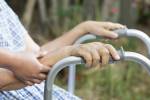I’m already plotting: I should die like a doctor
Ever since my wife gave me a paid-in-full burial plot for Valentine's Day, I have thought more about death.
When I was told where my grave would be two years ago -- "Darling, you'll be right next to me and my parents!" -- I could tell by my beloved's excitement that she felt she had finally come up with a Valentine's Day gift that I would remember.
And so I have.
I remember that my plot is near a pine tree and far away enough from the curb that a drunken driver who jumps it won't land on me. The last thing I want is the pain and expense of dying twice.
I remember that my plot is in River Rest Cemetery, which is where black folks buried their dead in a segregated Flint, Mich. I am prepared to hear a good-natured Gregorian chant of "there goes the neighborhood" from beyond the grave when my white self gets moved in.
But enough bragging about how well an African-American woman treats her white husband.
The truth is, the more I remember about my plot, the more I think about how I'll get there.
And now I have decided once and for all that I want to kick the bucket like a doctor.
I had been thinking along those lines for some time, but an article by Dr. Ken Murray in The Wall Street Journal the other day -- "How Doctors Die: It's Not Like the Rest of Us, But It Should Be" -- crystallized my cranial activity.
When a colleague discovered that a lump was caused by pancreatic cancer, where the best treatment gave him no more than a 15 percent chance of surviving five years, and then with a poor quality of life, Murray told of how his friend quickly closed his practice and never set foot in a hospital again.
"He focused on spending time with family and feeling as good as possible," Murray wrote. "Several months later, he died at home. He got no chemotherapy, radiation, or surgical treatment."
Physicians, notes Dr. Howard Baron, the president of the Clark County Medical Society, "are pretty good at knowing what modern medicine can do."
Baron stresses, as does Dr. Dale Carrison, chief of staff at University Medical Center, that doctors want to live just as much as the next guy. But when grievously ill, they don't want heroic measures taken, where what they call "futile care" is performed with the latest technology.
Murray describes such care this way: "The patient will get cut open, perforated with tubes, hooked up to machines and assaulted with drugs. All of this happens in the Intensive Care Unit at a cost of tens of thousands of dollars a day. What it buys is misery we would not inflict on a terrorist."
Carrison recalled a frail 90-year-old woman who came to the emergency room in cardiovascular distress. Her grieving family asked that he do everything possible to keep her alive. Though he knew the woman had no chance to live and delicately told the family so, Carrison said he had to abide by the family's choice or face litigation
As he did CPR, he could hear her ribs break as they always do in this possible life-saving measure.
"I felt terrible hurting her like that," he said. "She lived on life support until the family finally made the decision to cut it off."
Because there's always the chance I'll end up like that woman and not be able to walk away from treatment after an unwelcome diagnosis, I have now done what Baron and Carrison say most doctors do -- filled out paperwork designating my wishes in end-of-life situations.
"If you do fill one out, make sure your loved ones know where it is," said Carrison. "I have seen people go through a lot of treatment they didn't want to have because it took too long to find."
For me to spell out my end-of-life wishes, I had to come to the conclusion -- given my experience with physicians -- that few would advise against further treatment of whatever condition I have just to save time, or money or effort. Given that there are certainly other doctors who would keep me alive with treatments, no matter how pointless, just to make more money, I don't see any real reason for worrying that I'll be given up for dead before it's my time to go.
So it goes when a wife's gift of love on Valentine's Day is spelled "P-L-O-T."
Paul Harasim is the medical reporter for the Las Vegas Review-Journal. His column appears Mondays. Harasim can be reached at pharasim@reviewjournal.com or 702-387-2908.
Living Will
A living will, or advanced directive, designating your wishes in end-of-life situations can be prepared for free. People can go to livingwilllockbox.com, and hospitals have free paperwork that serves the same function.























